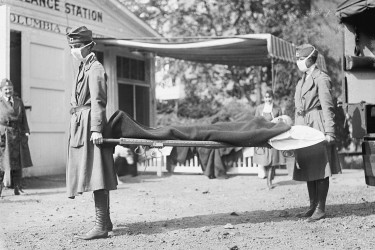As you argued in 2005, a global pandemic of some kind was all but inevitable. The novel coronavirus is a terrible scourge. But it is much less lethal than some of the avian-influenza strains that have come within a few mutations of achieving human-to-human transmissibility. Given this, one might see a silver lining in the fact that the first major pandemic of the 21st century poses relatively little risk to children. We will still pay a horrific toll for our governments’ myopia and negligence. But at least we will emerge from this having finally learned our lesson. And when the next, potentially more lethal bug hops the species barrier, we will be prepared. Do you find solace in such reasoning?
Let me start with an analogy. Let’s take the case of wildfires and earthquakes, which I write about a lot, at least insofar as they affect California. In both those cases, the learning curve is either flat or negative. There may be some slight reform that comes out of it. But at the end of the day, we repeat the same bad policies. We keep doing the same things that made people vulnerable to the previous fire or to the previous earthquake. And that’s because of the huge inertia built into the system. Right now, in San Diego County where I live, we’ve had two of the largest wildfires of the 21st century. And there’s 100,000 homes in development in high- or critical-fire-risk areas.
The last great earthquake of the 1990s led to only minor improvements in structural safety. So there are these inertial interests that oppose lesson learning and reform on a serious scale. Now, the record with epidemic disease is mixed. But go back to SARS. SARS initially created a greater scare than the avian flu had. One guy got it at an airport hotel. Everyone he came in contact with got infected, and within 24 hours this thing had appeared in five different countries. So there was research done. There were two candidate vaccines developed for SARS. But there was no money to take them any further. And so these vaccines sat in refrigerators. There was no profit to be had from them. Those vaccines might confer cross-immunity to the current coronavirus. But we’ll never know.
And that’s what tends to happen: When world trade or the lives of people in rich countries is threatened, you see this huge flurry of activity. But once the threat declines, the money or funding disappears.
We’ve disinvested in public health. The private sector has been unable to develop the lifeline medicines that we need. In terms of international coordination, I don’t think the WHO is going to exist in the present form a year from now, not after the withdrawal of American support.
During the Cold War, both the United States and the Soviet Union put a lot of effort into world public health as part of their respective efforts to influence nonaligned countries (ex-colonial countries). So the U.S. launched its famous malaria campaign, and the Soviet Union, in 1958, launched the campaign that eventually rendered smallpox extinct. After the Cold War ended, there was no geopolitical or foreign-policy reason to pay that much attention to public health in the poorer part of the world. Now who’s going to rebuild an international infrastructure to raise the capacities of poorer countries to detect and respond to diseases? To ensure that the stockpiles are adequate to meet the challenge anywhere on the globe? I don’t see anybody doing that.
The United States has abdicated. China is very equivocal about this. Although they are now the first responder in 18 or 20 countries, they’ve been very equivocal about investment. They never put that much into the World Health Organization. They never stepped into America’s shoes. Will they now? That’s totally unclear. Because nationalism is everywhere. And it’s defeated international public-health cooperation in this outbreak. So we’re going to be left with a research community that is more spirited and international and willing to cooperate with each other than at any time in history, but with governments that have turned their backs on all the post-World War II institutions [of global cooperation]. Except for the World Bank and IMF, of course. And it’s the World Bank whose structural-adjustment programs destroyed health systems throughout the debtor world in the 1980s and 1990s.
